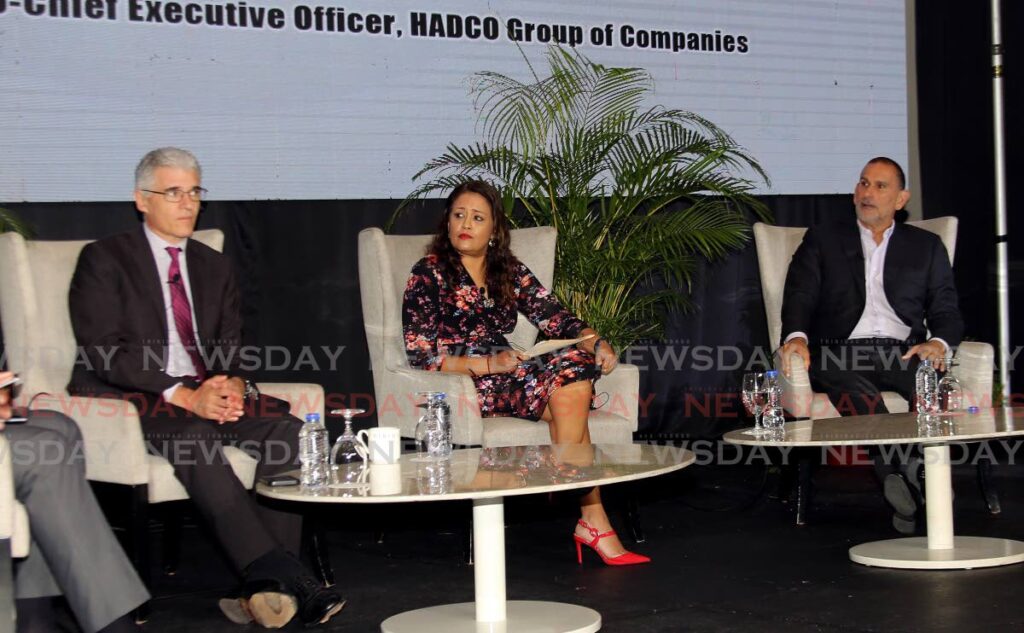ESG in Trinidad and Tobago is all talk, no action says Hadad

ENVIRONMENTAL, social and corporate governance (ESG) was one of catchphrases in conversations at the Institute of Chartered Accountants of TT (ICATT) conference held at the Hyatt Regency in Port of Spain, last Thursday and Friday.
Having a good ESG score would signify a company’s commitment to customers, staff, the environment and the governance of the company to ensure sustainable practices.
Because it has become a large part of the investment process for many businesses, a high ESG score would give companies an edge when it comes to competitiveness and attractiveness to investors.
So it would be a no-brainer to assume that companies in TT would have well-established ESG policies and they would consistently be shared and collaborated on with investors.
However, in a panel discussion including group sustainability officer at Republic Bank, Tisha Marajh, CEO and president of the Energy Chamber, Dr Thackwray “Dax” Driver, and group co-CEO of Hadco Group of Companies, John Hadad, it was expressed that not every company in TT is sharing its ESG policies. One of the main reasons for that, Hadad said, was because many investors do not even ask for them.
“We deal with banks everywhere,” Hadad said. “We deal with suppliers abroad, we deal with suppliers locally, we deal with customers in almost every continent. No one has ever asked us, 'Where is your ESG policy?' Not even a local bank. They never ask: 'Do you have something in place?', 'Are you even speaking about ESG?' or 'What are you doing?'”
The trend (in ESG locally) is a lot of talk, but no action. Just like Nato,” Hadad said. “It’s just an esoteric term that is being bandied about with no real action in TT.”
He said the same companies which do not bother asking for ESGs to begin investing in local companies have high ESG standards when operating outside of the region.
“We know that our foreign suppliers, and we deal with multinationals, we know that they have very strong ESGs. We see it online and we know what they are doing. But when it comes to dealing with companies in our lesser developed states, they don’t ask the questions or insist upon some of the things that they have to do within their own countries. I beg the question, what makes us different? That is almost a breach of ESG, as far as we are concerned,” he said.
He called on foreign investors to challenge local businesses in their ESG policies and ask relevant questions to ensure that they are operating with ESGs in mind.
Marajh said that 25 years ago, banks and investors did not look into ESGs as a part of their investment strategies, but now several banks and major conglomerates are adopting ESGs as a means of identifying potential investment opportunities.
But people may confuse ESGs with corporate social responsibility and corporate giving.
“We use CSR in the wrong way,” she said. “What we talk about in CSR is really corporate giving. We take some money there are projects that need funding and we fund them. There is very little feedback or monitoring or evaluation with using data. That’s the danger when we want to transfer CSR into ESG, because you run the risk of greenwashing.”
One example of greenwashing – sharing disinformation to present an environmentally responsible public image – was Volkswagen’s “diesel dupe” in 2015, where the company installed something called a “defeat device” that could detect when vehicles were being tested for emissions and changing the performance to improve results.
As a result, the vehicles had to recall the products costing the company £4.8 billion and resulting in the company’s first quarterly loss in 215 years of €2.5 billion in October 2015. The company was also fined US$1.5 billion for the dishonest act.
“Risk is really directed to ethical and legal management of an organisation,” she said. “Transparency and accountability and accuracy of performance are important.”
Hadad said his company tries to look at ESGs and policies to support them from a pragmatic standpoint. He said his team tries to read constantly and makes every effort to understand the meaning of several of the newer labels and buzzwords, and the philosophies behind them.
“The way we look at it is ESGs say to companies that we in the private sector that controls capital have the power to be a social enterprise, and internalise a social conscience and embed it, and really have it as a part of who we are. It describes all of what we should be doing to not only add value in terms of creating profit but more than that,” he said.
He, however, called for more developed countries to go easier on developing countries that may have just begun benefiting from hydrocarbons.
“At the end of the day, all of these policies that they set up in ESG, and they talk about hydrocarbons, I ask the question, should we as a country be spoken to about our hydrocarbon production? How was Norway’s sovereign wealth built? Should we or Guyana be allowed a little leeway? Give us a bligh, nah.”

Comments
"ESG in Trinidad and Tobago is all talk, no action says Hadad"